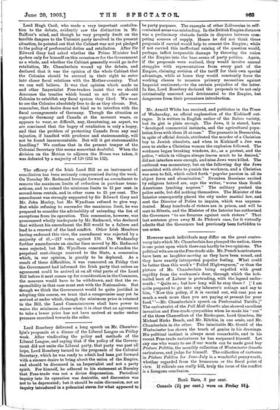Lord Hugh Cecil, who made a very important contribu- tion
to the debate, evidently saw the distinction in Mr. Balfour's mind, and though he very properly dwelt on the terrible dangers to the 'Unionist party involved in the present situation, he pointed out that the Cabinet was not yet pledged tb the policy of preferential duties and retaliation. After Sir Edward Grey had asked whether the Prime Minister had spoken only for himself on this occasion or for the Government as a whole, and whether the Cabinet generally would go in for retaliation, Mr. Chamberlain wound up the debate, and declared that it was the opinion of the whole Cabinet that the Colonies should be secured in their right to enter into closer fiscal relations with the Mother-country. That we can well believe. It was that opinion which made us and other Imperialist Free-traders insist that we should denounce the treaties which bound us not to allow our Colonies to establish any fiscal system they liked. We want to see the Colonies absolutely free to do as they choose. But, remember, that desire does not bind us to interfere with the fiscal arrangements of Germany. Though the situation as regards Germany and Canada at the moment wears, or appears to wear, so difficult, nay, threatening, an aspect, we are convinced that the bogey of retaliation is only a, bogey, and that the problem of protecting Canada from any real injustice, if handled with prudence and statesmanship, will not be found insurmountable. But will it get statesmanlike handling? We confess that in the present temper of the Colonial Secretary this seems somewhat doubtful. When the division on the Motion to adjourn the House was taken, it was defeated by a majority of 120 (252 to 132).










































 Previous page
Previous page